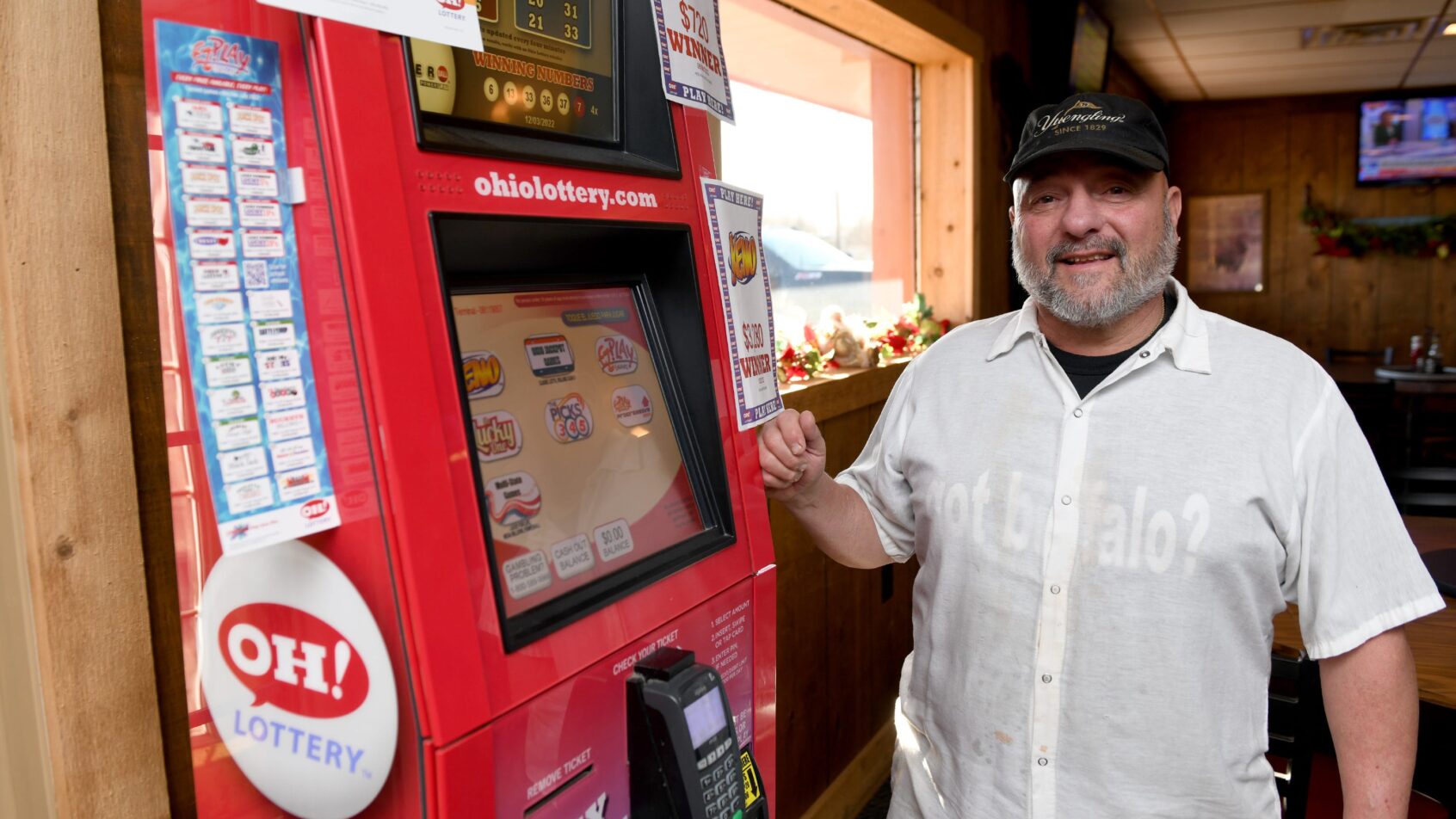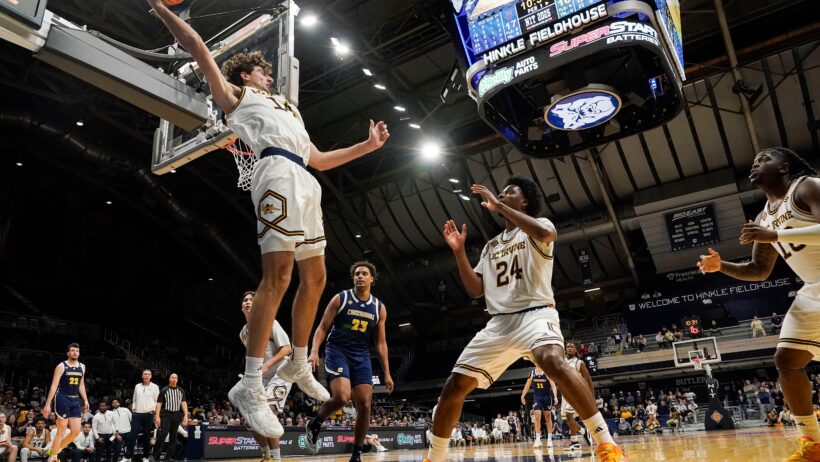Nearly All Ohio Type-C Sports Betting Kiosks Will Go Offline in June
By Robert Linnehan in Sports Betting News
Updated: June 3, 2025 at 10:46 am EDTPublished:

- Intralot will exit the Type-C sports betting market by June 22, taking 93% of Ohio’s total kiosk locations offline
- Ohio Bar Association President says sports betting kiosks never lived up to expectations
- Sen. Nathan Manning (R-13) recently described the Type-C sports betting experiment as a “colossal failure”
Just two years after launch, the vast majority of Ohio sports betting kiosks will go offline in the Buckeye State by June 22.
The Ohio Lottery recently reported to Sports Betting Dime the largest vendor of the Type-C sports betting kiosks, Intralot’s Sports Bet Ohio brand, will be withdrawing from Ohio entirely by June 22.
Aside from just a few remaining locations hosted by UbetOhio, Intralot’s withdrawal will put a near end to Ohio’s sports betting kiosk market, which Sen. Nathan Manning (R-13) recently described as a “colossal failure.”
Sports Betting Kiosks Never Lived Up to Expectations
Type-C sports betting kiosks, as well as retail and online sports betting, launched on Jan. 1, 2023 with 772 locations throughout the state. However, it quickly became obvious that the self-service kiosks could not compete with the online sports betting market and was not the draw bar and restaurant owners believed they would be.
At the height of its market, sports betting kiosks were located in 940 locations throughout Ohio – mainly in bars, restaurants, taverns, and bowling alleys – but suffered from a lack of betting markets, limited bet types (no parlays, no same game parlays, etc.), and reduced betting limits when compared with other betting options.
The most lucrative month for Type-C sports betting kiosks came in January 2024 when the Ohio Lottery reported $207,315 in gross gaming revenue. By contrast, the Ohio Casino Control Commission reported $111.1 million in gross gaming revenue for online sports betting in January 2024.
“In 2023, more than $30 million in bets were placed at sports betting kiosks, contrasted with more than $17 billion in bets placed through online sportsbooks,” an Ohio Lottery representative told Sports Betting Dime.
When launched, three Type-C sports betting kiosk vendors – BetSkyBox, Intralot’s Sports Bet Ohio brand, and UBETOhio – provided all of the sports betting kiosks to locations throughout the state.
However, BetSkyBox exited the state on July 16, 2024, and Sports Bet Ohio will leave the market on June 22, 2025, according to the Ohio Lottery. Of the 704 active locations with sports betting kiosks, 656 of them are provided by Sports Bet Ohio. All of these kiosks will go offline when the company leaves the market, eliminating 93% of the total market.
Intralot did not respond to several emails and phone calls asking for comment on its Ohio exit.
UBETOhio will still have 48 live locations with kiosks in the state. UBETOhio CEO Andy Westmeyer told Sports Betting Dime the company will continue to keep its kiosks live and offering in-person sports betting through its 48 locations. Prior to legalization, Westmeyer said experts hired by UBETOhio estimated retail sports betting would make up between 2% to 5% of Ohio’s sports betting market.
“What ended up happening was it was less than 0.2% of the entire market,” he said. “We re trying to stay around as long as possible. We are trying to keep viable and to see what happens.”
Never a Game Changer
During a recent committee hearing for his iGaming bill, Sen. Manning listened to a number of bar and restaurant owners plead to be included in his legislation in some way, to make up for gaming revenues that were supposed to come from sports betting.
It was clear, Manning said during the hearing, that Type-C sports betting kiosks were a “colossal failure.”
Andrew Herf, executive director of the Ohio Bar Owners Association, which represents the interests of Ohio business owners with liquor licenses, told Sports Betting Dime the kiosks almost had no shot to be successful from the start.
“I always thought, if sports betting is on phones, than we’re dead. The kiosks were never about the money from the gambling, it was always going to be a way to keep people in the bar, and that didn’t happen,” he said.
It became obvious, Herf said, that the lure of sports betting was not going to keep people coming back to bars when they could place bets on their phone. A sports bet takes hours to conclude, and people were not going to stick around for hours until their event concluded.
Kristin M. Mullins, CEO/President of the Ohio Grocers Association, a non-profit trade association representing more than 400 grocers in the state, told Sports Betting Dime the sports betting kiosk rollout was “poor” and never a game changer for supermarkets.
“Yes, the rollout was poor. Allowing it on cell phones prior to brick-and-mortar, plus having provider issues, did not help. We found that not many stores either decided to opt-in nor keep sports betting as one of their offerings,” she said.
With sports betting kiosks having little impact for Ohio small businesses, several groups have their eye on another form of legalized gaming that they think could make up for the kiosks lack of success.
Proprietors Asking for Video Lottery Terminal Legalization
With sports betting kiosks never reaching expectations, Ohio bar, grocery, and restaurant owners are looking to a new form of gaming. Video lottery terminals (VLTs), electronic slot machines that are currently live but illegal in Ohio, could offer a potential lifeline for small business owners in the state, Herf said.
The machines are currently illegal in Ohio, but nearly 40,000 are currently located in gaming parlors throughout the state. Several supporters of the gaming machines testified during the third hearing of Manning’s iGaming bill last week, asking the lawmaker to include legalized VLTs in his legislation and allow them to be placed in state establishments.
“I think the VLTs will work. It’s a totally different game than sports betting. You can mindlessly place a $2 bet, potentially win $100. They will work better. There are many legislators in the state that want to find a way to leverage gaming, but also help people in their districts. Unless you live in a district with a casino or racino, you’re not seeing these revenues. Every district has a bar, a bowling center, a truck stop, a convenience store where these could be. I think they want to help these types of business owners,” Herf said.
Westmeyer agreed, noting that UBETOhio has strong connections with its partners, who have all expressed strong interest in offering VLTs.
Lawmakers need to understand that iGaming revenues will go to casinos and to online operators, but will not go to local businesses. The millions of estimated VLT revenues will help small bar owners, waitstaff, food distributors, everyone in the industry, he said.
“If the state is willing to go do the legalized VLT route, that can bring business back to Ohio and we want to be a part of that. We will continue to allow sports betting as long as possible, and hopefully that will lead to us also having opportunities to offer VLTs,” Westmeyer said.
David Sloan and Bill Nader, both of Arc Gaming, estimated during Manning’s bill hearing that nearly 40,000 illegal machines currently operate in Ohio. If legalized, Nader suggested putting 30,000 of those machines back in Ohio bars and stores, while taxing revenues at a rate of 35%. At this rate, Nader estimated Ohio could see more than $600 million in additional tax revenue every year.
Legal VLTs in Illinois generated more than $1 billion in 2023 alone, Nader said. It is estimated that Illinois will report more than $1.2 billion in revenue for 2024.
Mullins told Sports Betting Dime that Ohio grocers would likely be interested in these machines as well.
“Yes, we would be in favor of the legalization of VLT’s. We know that not every grocery store has the desire, nor space, to accommodate this, but for those that do, we would like that opportunity. Grocers are more than able to handle age-restricted purchases – we do it today with liquor, tobacco and lottery. We know that if a grocer chooses to take advantage of VLTs, then they will do so in a safe, controlled manner and retail’s ‘piece of the gambling pie’ isn’t going to be so large as to really affect others in the gaming world; so, why not let Ohioans have access to them when and where they choose?” she said.

Regulatory Writer and Editor
Robert Linnehan covers all regulatory developments in online gambling and sports betting. He specializes in U.S. sports betting news along with casino regulation news as one of the most trusted sources in the country.



